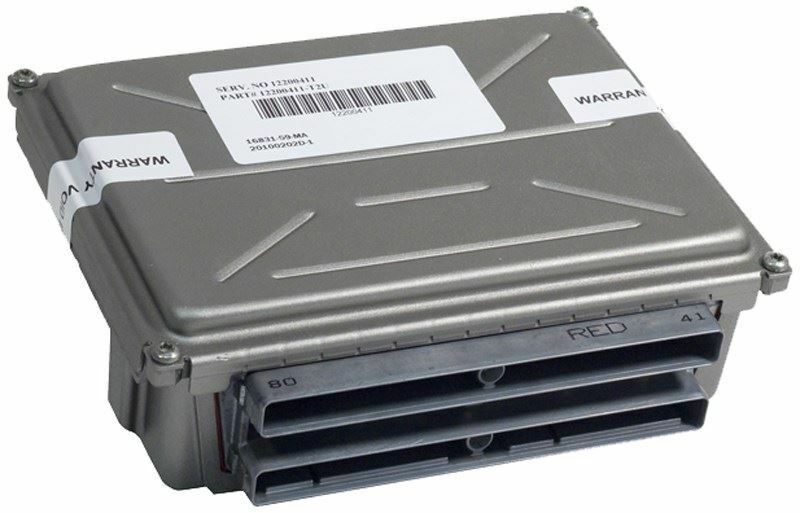Is Your GM Truck or Van Running Rough?
If you’re experiencing frustrating issues like a persistent check engine light, erratic engine behavior, poor fuel economy, or even a no-start condition in your 2003 GMC Yukon XL 2500 or other compatible GM vehicle, a failing Powertrain Control Module (PCM) is a likely culprit. The PCM is the central computer of your vehicle, responsible for managing everything from fuel injection and ignition timing to transmission shifting and emissions control. When it begins to fail, it can cause a cascade of problems that are often difficult to diagnose, leaving you stranded and facing costly repair bills.
This replacement PCM, part number 89017733, is the definitive solution to restore your vehicle’s performance, reliability, and drivability. We take the guesswork and hassle out of the repair process. Unlike sourcing a part from a junkyard or a dealership, this module comes pre-programmed with the latest GM software updates, specifically calibrated to your vehicle’s unique Vehicle Identification Number (VIN). This ensures optimal performance and a seamless, plug-and-play installation process, getting you back on the road faster.
From the Diagnostic Bay
I once had a 2003 Silverado 2500 with the 8.1L engine come into the shop with a complaint of intermittent stalling and a random misfire code that would jump from cylinder to cylinder. The owner had already replaced the spark plugs, wires, and even a couple of ignition coils, with no success. After hooking up the scanner and monitoring live data, I noticed the injector pulse width and ignition timing signals were fluctuating wildly at idle. Instead of continuing to chase individual components, we inspected the PCM. We found subtle corrosion on one of the main connector pins, which was causing intermittent signal loss. Swapping in a properly programmed PCM, like this one, solved all the issues instantly. It’s a classic case of symptoms pointing to multiple smaller parts when the root cause is the central computer itself.
Common Symptoms of a Failing PCM
- ✔ Check Engine Light: The most common indicator, often with codes related to module communication errors (U-codes), sensor circuits, or processor faults.
- ✔ Engine Stalling or Misfiring: The engine may stall for no apparent reason, run rough, or experience random misfires that are difficult to pinpoint.
- ✔ Poor Performance & Fuel Economy: A faulty PCM can’t efficiently manage the engine, leading to a noticeable drop in power, acceleration, and miles per gallon.
- ✔ No-Start Condition: The vehicle may crank but fail to start because the PCM isn’t commanding the fuel pump or ignition coils to operate.
- ✔ Harsh or Incorrect Shifting: The PCM also controls transmission functions, and a failure can result in erratic shifting, getting stuck in a gear, or delayed engagement.
- ✔ Communication Issues: Your diagnostic scan tool may be unable to communicate with the PCM, indicating a complete internal failure.
The Superior Solution: Our 2003 Yukon XL 2500 PCM
Choosing the right replacement part is critical for a lasting repair. Our modules are meticulously prepared to meet and exceed original equipment standards. The key benefit is our professional programming service. When you provide your VIN, we don’t just load a generic file; we flash the module with the most current, stable software version available from General Motors for your specific vehicle configuration. This process corrects many of the original software bugs and drivability issues that may have existed from the factory, ensuring your engine and transmission operate at peak efficiency. This is a vital step that many other suppliers skip, and it’s essential for proper vehicle function.
This module is a direct replacement for a wide range of original equipment service numbers, including: 12581565, 8125815650, 12570557, 12570558, 12576106, 12576869, 12578127, 88864822, and 89017733.
Broad Compatibility Across the GM Lineup
While this is a perfect fit for the 2003 GMC Yukon XL 2500 with the 8.1L engine, this versatile P59-style PCM was used in a large number of GM trucks, vans, and even some cars. Please verify your part number and application, but this unit is also compatible with the following vehicles:
- Chevrolet Avalanche 2500 (2003)
- Chevrolet Express/GMC Savana Vans (1500, 2500, 3500) (2003)
- Chevrolet Silverado/GMC Sierra Pickups (1500, 2500, 3500) (2003) – 4.3L & 8.1L Gasoline
- Chevrolet Suburban 2500 (2003) – 8.1L
- Chevrolet Astro/GMC Safari Vans (2003)
- Chevrolet S10/GMC Sonoma Pickups (2003) – 4.3L
- Chevrolet Blazer/GMC Jimmy (2003)
- Cadillac CTS (2004) – Base, ID 12581565
- Chevrolet Corvette (2004) – ID 12581565
Don’t let a faulty computer keep your vehicle off the road. Order this pre-programmed PCM today and restore the dependable performance you expect from your GM vehicle.
Frequently Asked Questions
Do I need to get this PCM programmed?
No. This Powertrain Control Module is sold as a pre-programmed service. After your purchase, you must provide us with your vehicle’s VIN. We will then flash the module with the correct software for your specific vehicle before it ships, making it ready for installation right out of the box.
What is a VIN and why do you need it?
The VIN (Vehicle Identification Number) is a unique 17-digit code for your specific vehicle. It contains critical information about the make, model, year, engine, transmission, and other factory-installed options. We use this information to load the exact software calibration from GM, ensuring the PCM works perfectly with your vehicle’s systems.
Will this part require a security relearn procedure?
In many GM vehicles of this era, yes. After installation, you may need to perform a simple security relearn procedure (often called Passlock or VATS relearn) so the module can recognize your vehicle’s anti-theft system and keys. This procedure typically involves a series of key cycles and can be done without any special tools. Instructions are widely available online for your specific model.
Is a Crankshaft Variation Relearn (CASE Relearn) necessary?
For optimal performance and to prevent a P1336 trouble code, a CASE relearn is highly recommended after installation. This procedure synchronizes the new PCM with the crankshaft position sensor. While the vehicle will usually run without it, the relearn ensures the most accurate misfire detection. This procedure must be performed with a compatible bi-directional scan tool.
Is this a difficult part to install?
For someone with moderate mechanical experience, the physical installation is straightforward. The PCM is typically located in the engine bay (under the battery tray on many trucks). The main steps involve disconnecting the battery, unplugging the electrical connectors, and unbolting the module. The most important part is ensuring the battery is disconnected to prevent electrical damage.
Will this fix my check engine light?
If the check engine light and associated symptoms are caused by a faulty PCM, then yes, this part will resolve the issue. However, it’s crucial to ensure a proper diagnosis has been performed. This module will not fix problems related to other failed sensors, wiring, or mechanical components.


